Wayne Winston is Professor of Operations and Decision Technologies in the Kelley School of Business at Indiana University, where he has taught since 1975. Wayne received his B.S. degree in Mathematics from MIT and his Ph.D. degree in Operations Research from Yale. He has written the successful textbooks Operations Research: Applications and Algorithms, Mathematical Programming: Applications and Algorithms, Simulation Modeling with @Risk, Practical Management Science, Data Analysis for Managers, Spreadsheet Modeling and Applications, and Financial Models Using Simulation and Optimization. Wayne has published over 20 articles in leading journals and has won many teaching awards, including the school-wide MBA award four times. His current interest is in showing how spreadsheet models can be used to solve business problems in all disciplines, particularly in finance and marketing.
Marketing Analytics: Data-Driven Techniques with Microsoft Excel by Wayne Winston
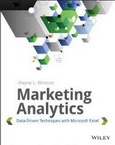 Helping tech-savvy marketers and data
analysts solve real-world business problems with Excel
Helping tech-savvy marketers and data
analysts solve real-world business problems with Excel
Using data-driven business analytics to understand customers and improve results is a great idea in theory, but in today's busy offices, marketers and analysts need simple, low-cost ways to process and make the most of all that data. This expert book offers the perfect solution. Written by data analysis expert Wayne L. Winston, this practical resource shows you how to tap a simple and cost-effective tool, Microsoft Excel, to solve specific business problems using powerful analytic techniques—and achieve optimum results. $35 720 pg 2014
Practical exercises in each chapter help you apply and reinforce techniques as you learn.
- Shows you how to perform sophisticated business analyses using the cost-effective and widely available Microsoft Excel instead of expensive, proprietary analytical tools
- Reveals how to target and retain profitable customers and avoid high-risk customers
- Helps you forecast sales and improve response rates for marketing campaigns
- Explores how to optimize price points for products and services, optimize store layouts, and improve online advertising
- Covers social media, viral marketing, and how to exploit both effectively
Microsoft Excel 2013: Data Analysis and Business Modeling by Wayne Winston 2014
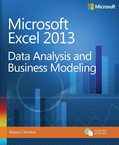 Master business modeling and analysis
techniques with Microsoft Excel 2013, and transform data into bottom-line
results. Written by award-winning educator Wayne Winston, this hands-on,
scenario-focused guide shows you how to use the latest Excel tools to
integrate data from multiple tables—and how to effectively build a
relational data source inside an Excel workbook. 888 pg $35
Master business modeling and analysis
techniques with Microsoft Excel 2013, and transform data into bottom-line
results. Written by award-winning educator Wayne Winston, this hands-on,
scenario-focused guide shows you how to use the latest Excel tools to
integrate data from multiple tables—and how to effectively build a
relational data source inside an Excel workbook. 888 pg $35
Solve real business problems with Excel—and sharpen your edge.
- Summarize data with PivotTables and Descriptive Statistics
- Explore new trends in predictive and prescriptive analytics
- Use Excel Trend Curves, multiple regression, and exponential smoothing
- Master advanced Excel functions such as OFFSET and INDIRECT
- Delve into key financial, statistical, and time functions
- Make your charts more effective with the Power View tool
- Tame complex optimization problems with Excel Solver
- Run Monte Carlo simulations on stock prices and bidding models
- Apply important modeling tools such as the Inquire add-in
Mathletics: How Gamblers, Managers, and Sports Enthusiasts Use Mathematics in Baseball, Basketball, and Football by Wayne Winston 2012
 Mathletics is a remarkably entertaining
book that shows readers how to use simple mathematics to analyze a range of
statistical and probability-related questions in professional baseball,
basketball, and football, and in sports gambling. How does professional
baseball evaluate hitters? Is a singles hitter like Wade Boggs more valuable
than a power hitter like David Ortiz? Should NFL teams pass or run more
often on first downs? Could professional basketball have used statistics to
expose the crooked referee Tim Donaghy? Does money buy performance in
professional sports? $40 392 pg. 2012
Mathletics is a remarkably entertaining
book that shows readers how to use simple mathematics to analyze a range of
statistical and probability-related questions in professional baseball,
basketball, and football, and in sports gambling. How does professional
baseball evaluate hitters? Is a singles hitter like Wade Boggs more valuable
than a power hitter like David Ortiz? Should NFL teams pass or run more
often on first downs? Could professional basketball have used statistics to
expose the crooked referee Tim Donaghy? Does money buy performance in
professional sports? $40 392 pg. 2012
In Mathletics, Wayne Winston describes the mathematical methods that top coaches and managers use to evaluate players and improve team performance, and gives math enthusiasts the practical tools they need to enhance their understanding and enjoyment of their favorite sports—and maybe even gain the outside edge to winning bets. Mathletics blends fun math problems with sports stories of actual games, teams, and players, along with personal anecdotes from Winston's work as a sports consultant. Winston uses easy-to-read tables and illustrations to illuminate the techniques and ideas he presents, and all the necessary math concepts—such as arithmetic, basic statistics and probability, and Monte Carlo simulations—are fully explained in the examples.
After reading Mathletics, you will understand why baseball teams should almost never bunt, why football overtime systems are unfair, why points, rebounds, and assists aren't enough to determine who's the NBA's best player—and much, much more. In a new epilogue, Winston discusses the stats and numerical analysis behind some recent sporting events, such as how the Dallas Mavericks used analytics to become the 2011 NBA champions.
Data Analysis and Decision Making by Albright, Winston and Zappe
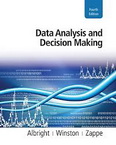 Data Analysis and Decision Making is a
teach-by-example approach, learner-friendly writing style, and complete
Excel integration focusing on data analysis, modeling, and spreadsheet use
in statistics and management science. The Premium Online Content Website
(accessed by a unique code with every new book) includes links to the
following add-ins: the Palisade Decision Tools Suite (@RISK, StatTools,
PrecisionTree, TopRank, RISKOptimizer, NeuralTools, and Evolver); and
SolverTable, allowing users to do sensitivity analysis. All of the add-ins
are revised for Excel 2007 and notes about Excel 2010 are added where
applicable. $219 1,080 pg. 2010 4th edition.
Data Analysis and Decision Making is a
teach-by-example approach, learner-friendly writing style, and complete
Excel integration focusing on data analysis, modeling, and spreadsheet use
in statistics and management science. The Premium Online Content Website
(accessed by a unique code with every new book) includes links to the
following add-ins: the Palisade Decision Tools Suite (@RISK, StatTools,
PrecisionTree, TopRank, RISKOptimizer, NeuralTools, and Evolver); and
SolverTable, allowing users to do sensitivity analysis. All of the add-ins
are revised for Excel 2007 and notes about Excel 2010 are added where
applicable. $219 1,080 pg. 2010 4th edition.
Financial Models Using Simulation and Optimization: A Step-By-Step Guide with Excel and Palisade's DecisionTools Software by Wayne Winston
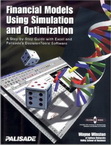 $54 459 pg 3rd ed. 2008
$54 459 pg 3rd ed. 2008
Financial Models Using Simulation and Optimization II by Wayne Winston
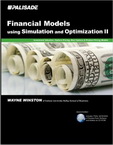 $40 382 pg. 2008
$40 382 pg. 2008
Simulation Modeling Using @RISK: Updated for Version 4 by Wayne Winston
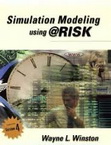 With its understandable explanations of Monte Carlo and step-by-step
instructions for Microsoft Excel, Lotus, and @Risk software, this
text/software package offers both the instruction and the practice students
need to begin solving complex business problems. It is designed for use as
the primary learning tool in a short business simulation course (for
advanced undergraduate and MBA students), or as a supplement to courses in
investments, corporate finance, management science, marketing strategy,
operations management, and actuarial science. $107 226 pg 1st edition, 2000.
With its understandable explanations of Monte Carlo and step-by-step
instructions for Microsoft Excel, Lotus, and @Risk software, this
text/software package offers both the instruction and the practice students
need to begin solving complex business problems. It is designed for use as
the primary learning tool in a short business simulation course (for
advanced undergraduate and MBA students), or as a supplement to courses in
investments, corporate finance, management science, marketing strategy,
operations management, and actuarial science. $107 226 pg 1st edition, 2000.
Table of Contents:
- WHAT IS SIMULATION? Actual Applications of Simulation / What's Ahead? / Simulation Models Versus Analytic Models
- RANDOM NUMBERS — THE BUILDING BLOCKS OF SIMULATION PROBLEMS
- USING SPREADSHEETS TO PERFORM SIMULATIONS Example 3.1: The Newsvendor Problem / Finding a Confidence Interval for Expected Profit / How Many Trials Do We Need? / Determination of the Optimal Order Quantity / Using Excel Data Tables to Repeat a Simulation / Performing the Newsvendor Simulation with the Excel Random Number Generator / Problems
- AN INTRODUCTION TO @RISK Simulating the Newsvendor Example with @RISK / Explanation of Statistical Results / Conclusions
- GENERATING NORMAL RANDOM VARIABLES Simulating Normal Demand with @RISK / Using the Graph Type Icons / Placing Target Values in the Statistics Output / Estimating the Mean and Standard Deviation of a Normal Distribution / Problems
- APPLICATIONS OF SIMULATION TO CORPORATE FINANCIAL PLANNING Using the Triangular Distribution to Model Sales / Sensitivity Analysis with Tornado Graphs / Sensitivity Analysis with Scenarios / Alternative Modeling Strategies / Problems
- SIMULATING A CASH BUDGET Example 7.1: Cash Budgeting / Problems
- A SIMULATION APPROACH TO CAPACITY PLANNING Example 8.1: Wozac Capacity Example / Problems
- SIMULATION AND BIDDING Uniform Random Variables / A Bidding Example / Problems
- DEMING'S FUNNEL EXPERIMENT Simulating Rule 1 (Don't Touch That Funnel!) / Simulating Rule 2 / Comparison of Rules 1-4 / Lesson of the Funnel Experiment / Mathematical Explanation of the Funnel Experiment / Problems
- THE TAGUCHI LOSS FUNCTIONS Using @RISK to Quantify Quality Loss / Problems
- THE USE OF SIMULATION ON PROJECT MANAGEMENT The Widgetco Example / Estimating Probability Distribution of Projected Completion Time / Determining the Probability That an Activity is Critical / The Beta Distribution and Project Management / Problems
- SIMULATING CRAPS (AND OTHER GAMES) Example 13.1: Simulating Craps / Confidence Interval for Winning at Craps / Problems
- USING SIMULATION TO DETERMINE OPTIMAL MAINTENANCE POLICIES Example 14.1 / Problems\
- USING THE WEIBULL DISTRIBUTION TO MODEL MACHINE LIFE Example 15.1: Simulating Equipment Replacement Decisions / Problems
- SIMULATING STOCK PRICES AND OPTIONS Modeling the Price of a Stock / Estimating the Mean and Standard Deviation of Stock Returns from Historical Data / What Is an Option? / Pricing a Call Option / Example 16.1a: Pricing a European Call Option with @RISK / Analyzing a Portfolio of Investments / Example 16.1b: Simulating Portfolio Return / Problems
- PRICING PATH-DEPENDENT AND EXOTIC OPTIONS Example 17.1: Pricing a Path Dependent Option / Problems
- USING IMMUNIZATION TO MANAGE INTEREST RATE RISK Duration / Convexity / Immunization Against Interest Rate Risk / Example 18.1: Immunization Using Solver / Better Models for Interest Rate Risk / Problems
- HEDGING WITH FUTURES Hedging with Futures: The Basics / Modeling Futures Risk with @RISK / Problems
- MODELING MARKET SHARE Example 20.1a: Market Share Simulation / Is Advertising Worthwhile? / Example 20.1b: Advertising Effectiveness / To Coupon or Not to Coupon? / Example 20.1c: Should Coke Give Out Coupons? / Problems
- GENERATING CORRELATED VARIABLES: DESIGNING A NEW PRODUCT Example 21.1 / Problems
- SIMULATING SAMPLING PLANS WITH THE HYPERGEOMETRIC DISTRIBUTION Example 22.1: Simulating a Sampling Plan / Problems
- SIMULATING INVENTORY MODELS Example 23.1: Simulating a Periodic Review Inventory System / Problems
- SIMULATING A SINGLE-SERVER QUEUING SYSTEM Example 24.1: Queuing Simulation in @RISK / Estimating the Operating Characteristics of a Queuing System / Problems
Decision Making Under Uncertainty With RISKOptimizer : A Step-To-Step Guide Using Palisade's RISKOptimizer for Excel by Wayne Winston
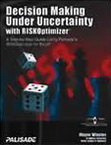 $38 244 pg 1999
$38 244 pg 1999
Marketing Analytics: Data-Driven Techniques with Microsoft Excel by Wayne Winston
 “Helping tech-savvy marketers and data
analysts solve real-world business problems with Excel." "shows you how to
tap a simple and cost-effective tool, Microsoft Excel, to solve specific
business problems using powerful analytic techniques—and achieve optimum results.”
$35 720 pg. 1999
“Helping tech-savvy marketers and data
analysts solve real-world business problems with Excel." "shows you how to
tap a simple and cost-effective tool, Microsoft Excel, to solve specific
business problems using powerful analytic techniques—and achieve optimum results.”
$35 720 pg. 1999
ARTICLES by Wayne Winston:
Watson, J. M. (1994). Instruments to assess statistical concepts in the school curriculum. In National Organizing Committee (Ed.), Proceedings of the Fourth International Conference on Teaching Statistics. Volume 1 (pp. 73-80). Rabat, Morocco: National Institute of Statistics and Applied Economics.

